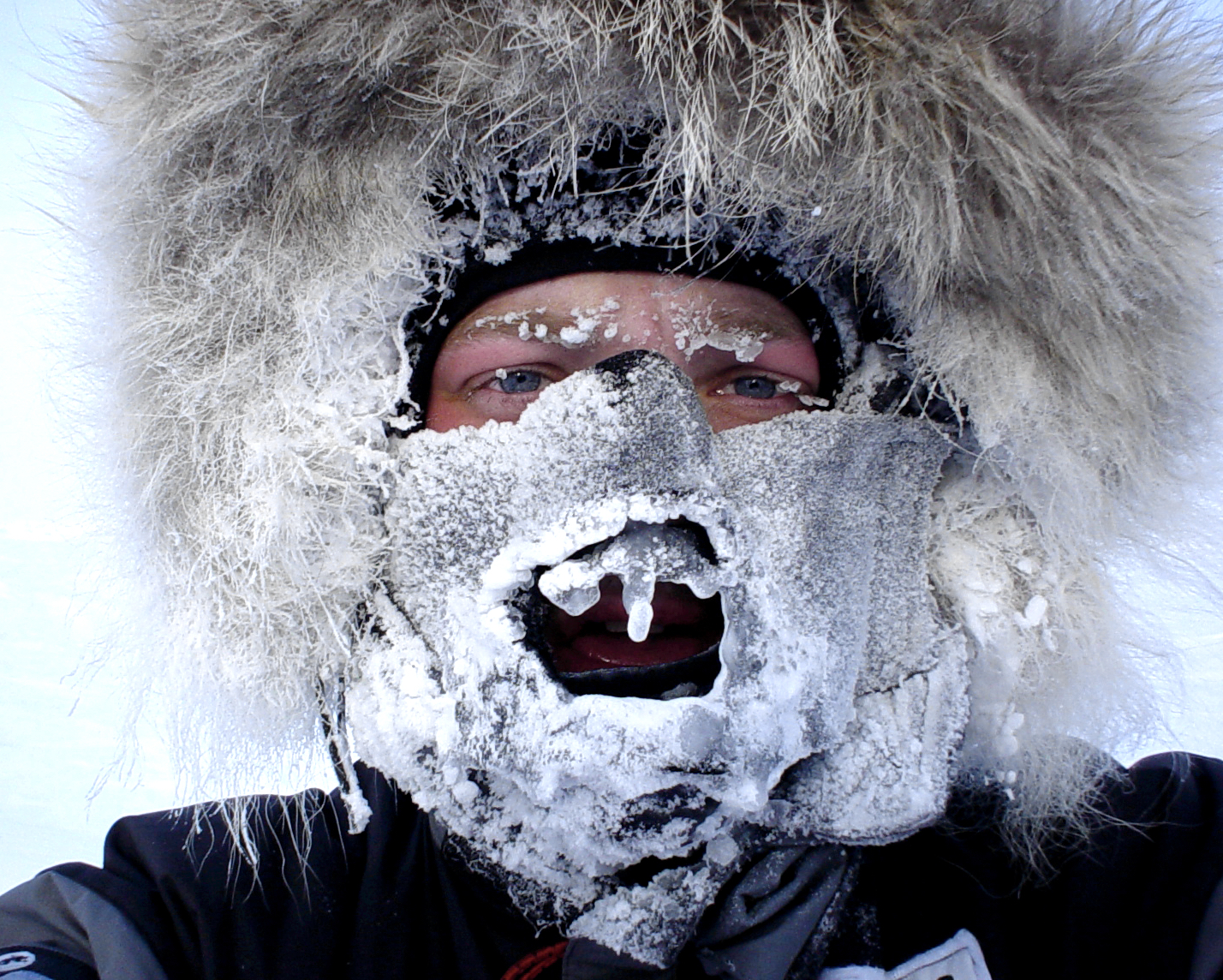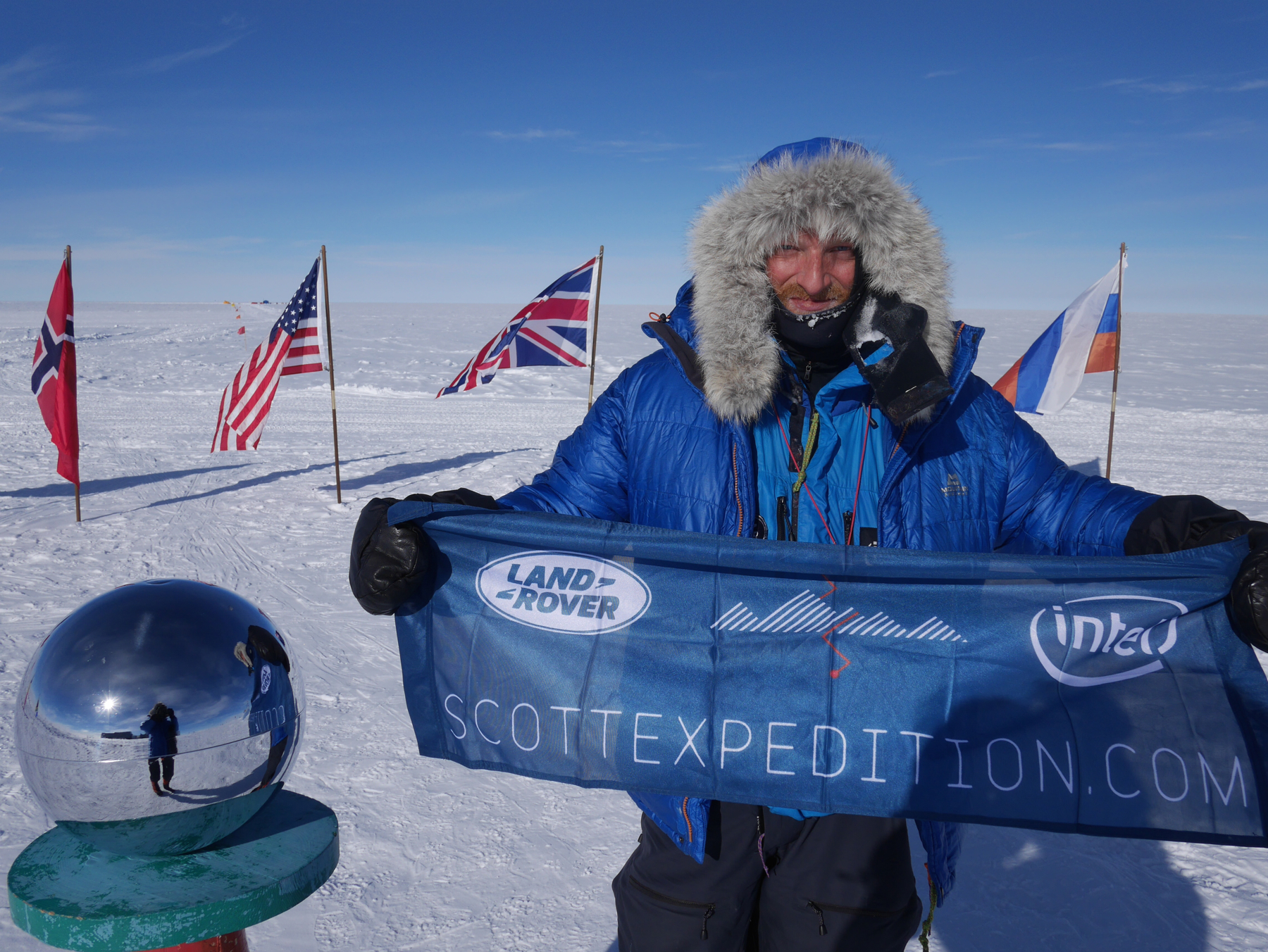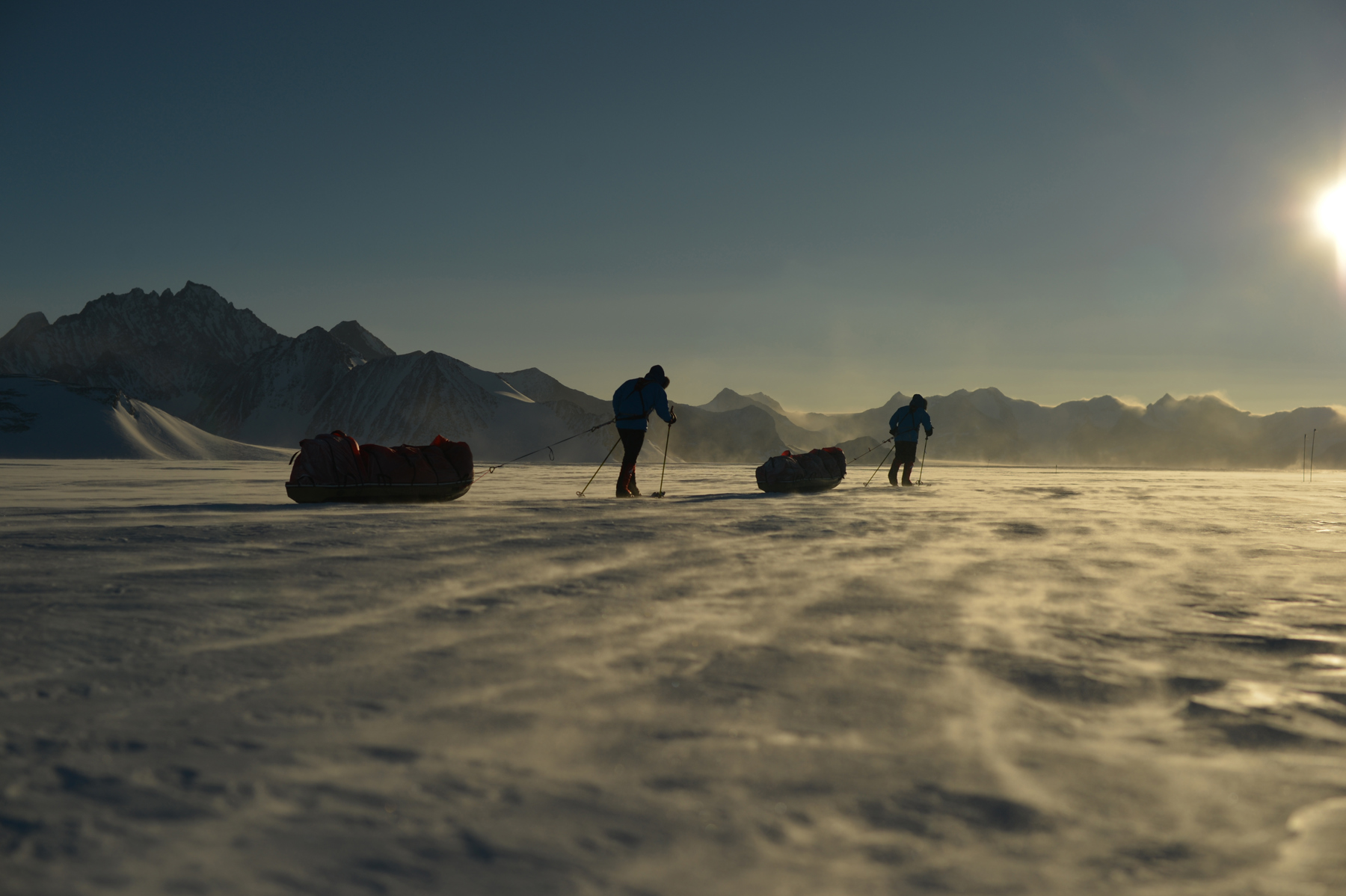Living life more adventurously
Our new Scout Adventurer, Ben Saunders, shares stories from his polar adventures (including watching James Bond near the South Pole) and vivid memories of Scouts, as well as what these have taught him about teamwork, communication and leadership.

Ben Saunders has dedicated his adult life to adventure and done things some of us have only dreamed of, and we’re not just talking about standing at the North or South poles (although he’s done both).
‘One of the most decadent things I’ve ever done was turning off my email in October 2013 in a little hotel in Chile, setting up my out of office saying that I won’t be checking email until late February next year, then saying if you want to contact me, you can’t.’ It’s something most of us can only dream of and a reminder, in Ben’s own words, for us to ‘live life more adventurously.’
We caught up with Ben to find out what adventure means to him.
As an adventurer, you’ve got the whole world to explore, but you chose to head to the poles – places where there’s almost nothing there. Why is that?
A few reasons. Firstly, I’m probably a frustrated astronaut. As a young boy, I was inspired by space – things like the Shuttle missions and the International Space Station being built. I loved science fiction, Star Trek and Star Wars and space LEGO. I was fascinated by space and the idea of exploration. But at the same time, I also loved reading about explorers, adventurers, mountaineers, and sailors. Britain, for such a small island, has this pretty rich history going all the way back – and even in the last generation, we’ve had some incredible pioneers; people like Chris Bonnington, Ranulph Fiennes and Doug Scott. I also grew up without knowing my dad and therefore there was a blank space: I was looking for a role model; a template of what it was to become a man. Looking back now, it’s obvious I latched onto these larger than life hero characters.
Who are your role models today?
I think my own development is mirrored by the changing faces of my role models and a lot of them now are women. There’s someone I’m currently working with – who’s completely self-made – a single mother who started a very successful company. She’s made a lot of money and given a lot of money away, and invested in big climate change and clean energy projects. She’s having a massive impact and all with no ego.
My heroes as a boy were these characters who had climbed a mountain or sailed solo round the world. My heroes now are the ones who are quietly, stoically, getting on with stuff.
What gave you a love of nature and the outdoors?
I was lucky in that most of my childhood was in the countryside – Devon, Somerset; both rural and remote. I would ride my bike to primary school. My best friend lived on the other side of the valley, so I would ride my bike down the hill and up the other side, or walk 40 minutes through the woods across the river to get to his house. My brother and I were also adventure buddies – we were able to be outdoors a lot and we were both in Scouts too when we moved to Kent.
Do you have some standout memories from your days as a Scout?
We used to do wide games (giant games played across a large outdoor area) which I loved. We also had those big wooden chests in the Scout hut, full of kit, and we were invited to use our imaginations to create obstacle courses and so on. It helped blow off steam before we got on with the proper programme for the night. Some of the best things we did were pioneering competitions with poles and ropes to see how high we could get a person off the ground. Scouts was definitely the highlight of the week.

What skills do you think you were you learning then?
Not that I was aware at the time, but I learnt three invaluable skills: teamwork, communication and leadership.
You can spend fifteen years in full time education and not learn any of these because it’s really hard to teach character in a classroom. This became clearer to me when I was working for a guy called John Ridgeway, who was a seminal character in my life. He was one of the first people to row across the Atlantic. He boxed for Great Britain and sailed round the world three times. He articulated these skills so well. He encouraged people to work together and really learn from each other. Looking back at Scouts, this was the first time I was exposed to the kinds of qualities that John embodied.
I went to six different schools. I didn’t like football (I played a little bit of rugby) so I think the things the young people normally learn through sport – like team work – I learnt from Scouts. I also learnt things you don’t learn anywhere – like night navigation!
Our Scout Troop also entered something called the Exmoor Challenge, which was a three-day crossing of the National Park. I’d only just joined Scouts, so I was probably aged only 11 or 12. I bought my first rucksack, which my mum helped me pack and it was far too heavy. I had to drop out before the end – they were all older than me and bigger than me – and I still remember the dismay of not finishing it. We had a brilliant leader and I wasn’t teased or anything, but I was gutted.
In my adult life – on a bigger scale – I’ve had failed expeditions when I’ve had to cut it short and be picked up. I think being exposed to that opportunity to fail at something early in life was so valuable. Looking back on my career, I’ve learnt far more from my failures than my successes.
I know you visited Captain Scott’s hut at the start of your 2013–14 expedition. How did that feel?
In October 2013 ,my great friend Tarka L'Herpiniere and I completed a 1,800-mile journey on foot from Scott’s hut on the coast to the South Pole and back – replicating the route of the famous explorer’s ill-fated final expedition. It was a journey, of course, that Scott and his companions didn’t survive. We were to start at Scott’s hut and then begin from there.
We flew in from Chile then took another flight all the way across the Antarctic continent to McMurdo. We landed on the sea ice, and it’s like a base out of Star Wars. From there, we had to head four days to Scott’s hut. Along the way, we met some New Zealanders and asked for directions. They told us there was a flagged route, which we started following. It was really cold – early in the season. Taking pity on us, the Kiwis tuned up in their snow tractor and offered us a lift!
Scott’s hut itself feels quiet, cosy and homely – a lived-in place. Some of the tables are still set for dinner and there are socks hanging up over the bunks that Bowers, Wilson and Oates slept in. It felt incredibly special, but quite spooky too. I was petrified about what lay ahead of us. This is the journey that defeated Shackleton and killed Scott. I kept thinking: ‘Why didn’t you listen to the people who told you it was impossible?’ I had the ultimate bout of imposter syndrome.
How have polar expeditions changed from those first pioneers who inspired you to attempt your modern-day adventures?
For me the polar regions have been infinitely more accessible. I could fly to Antarctica: that was unthinkable for Scott, Shackleton and Fridtjof Nansen, the famous Norwegian polar pioneer. For those Edwardian expeditions, it must’ve felt as far-fetched as a round trip to Mars.
The leaders of those early expeditions had no idea what they would find. They knew Antarctica was massive – the size of China and India put together. The rest was conjecture and guesswork. Some thought there was a hole in the middle that extended to the centre of the Earth. Others thought there was another ocean to be found there, and of course, they were sailing away from home for three years at a time.
In some ways, it was a different universe back then, while in other ways it was remarkably similar to polar expeditions now. I still wear a harness, drag my sledge and melt snow on a stove. I often wondered what the landscape would have looked like a century or so before us, and the truth is it was probably almost identical once you get inland. We saw nothing made by humans for weeks on end.
Today, I love the fact we can share our journeys with the world. I went on my first expedition with Pen Hadow in 2001 and we had just HF radio, which meant almost no communication in two months. We spoke to one radio operator in Canada the whole time. I love the fact I experienced that – but fast forward to 2013–14 and we’re sending video back. I love being able to tell the stories as they’re happening: it’s a real privilege to share the story as it is unfolding. Every evening on that expedition, in my sleeping bag, I would type up a blog for the day. It was a chance to inspire young people – we had lots of schools following us.
How does polar exploration affect your mental health?
Ultimately, it’s been a great positive and I’ve grown enormously as a person from these experiences. But in the short term, it can be challenging in all sorts of ways. My teammate, Tarka, and I came into that huge expedition with first-hand experience of small teams falling apart under pressure, trapped in a tent in a white out when it’s -40 degrees outside. We worked with a really good psychologist before we left. The theory we came up with was based on fixing small problems before they turned into big ones.
For example, when the tent had a rip in it, if we didn’t fix it right there and then, then it could jeopardise the whole expedition. We applied the same thinking to our relationship. If something wasn’t quite right, then we’d stop and talk about it and fix it. One of the bravest things we had to do was ask each other for help when we needed it – which came down to proper teamwork and communication, skills I first learnt in Scouts.

What things did you miss when you were in the middle of Antarctica?
Four months in Antarctica was the longest time I went without seeing any advertising and without buying anything. It was a long time without ‘stuff’, like houses, cars, new phones or any material goods – none of which I missed. The things I did yearn for were the people I cared about – friends and family. It’s such an alien environment; I unquestionably missed home.
Before I left on my most recent solo expedition, I went on eBay and bought a cheap Android phone. Then, when I got to Chile, I realised that I could download films that I could watch later in my sleeping bag in my tent in Antarctica. However, in the hotel in the southern tip of Patagonia, the only film I managed to download was Goldfinger – the James Bond film. I must have watched it ten times. The clip that I would revisit time and again was when James Bond played golf with the villain because you could hear birds singing in the background. That was one of the things I missed most: the sound of birds!
On our 2013–14 expedition, I took a Kindle, and my favourite of the many books I took with me was John Steinbeck’s Travels with Charley. My favourite section was in the Deep South of America – the heat, humidity and wonderful food were the antithesis of our life in Antarctica.
Towards the end of the long expedition, on the Ross Ice Shelf, I had an almost hallucinogenic food fantasy about walking into a cheap Chilean burger joint – meaning cheeseburgers remain my most vivid memory of the trip!
Oddly enough – particularly now we’ve lived through a global pandemic – one of the luxuries we took was a bottle of hand sanitizer, with a small spritz of it each evening becoming something of a ritual.
What has been your toughest moment?
You know, it wasn’t a crevasse field, or fixing eyes with a polar bear. The biggest obstacles I’ve had to overcome have been in my own head – my own fears, self-doubts and procrastination. All my expeditions have really been about exploring my own head; learning about my own potential and my ability to make things happen in the world.
What have you learnt about yourself?
Self-belief is a bit like a muscle. We all have it to some degree but it responds to stimulus, and I think the stimulus it responds to best is adventure: trying things, acting without certainty, and taking a risk. It’s about attempting something that you might fail in. A lesson I first learnt as a Scout on the hills of Exmoor.
Primarily, I want to encourage and inspire other people to live more adventurously. This doesn’t mean going on expeditions – but just being a bit braver. We’re all astronauts on the same bit of rock flying at 66,000 miles an hour round the sun, and if that isn’t an extraordinary, shared adventure then I don’t know what is!
Adventure is central to everything I have done, and the lessons which set me on that path we learnt in Scouts.
Find out more about Ben: bensaunders.com and @polarben